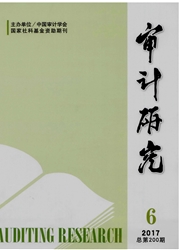

 中文摘要:
中文摘要:
本文在界定金融安全内涵的基础上,提出系统性风险的监控是政府审计维护金融安全的核心内容。进而,本文从连续审计的内涵看连续审计的适用性、从系统性风险的特征看连续审计的必要性、从我国政府审计的信息化建设看连续审计的可行性三个角度分析了连续审计适用于政府审计监控系统性风险的基本依据;从实施环境和实施人员两方面阐述了连续审计运用于政府审计监控系统性风险的实施条件;从建立重点领域、配置连续审计参数、持续跟进以及后续反馈这四个步骤探讨了连续审计在政府审计监控系统性风险中的实施路线。本文的研究结果以期为政府审计维护金融安全寻找一个切实有效的突破口,实现政府审计方法上的创新,从而提高政府审计监控的水平和效果,实现维护金融安全的目标。
 英文摘要:
英文摘要:
This paper proposes that it is monitoring systemic risk which is the core content to government audit for safeguarding financial security on the basis of defining financial security connotation. Based on above, we analyze the fundamental basis that continuous auditing is applicable for government audit to monitor systemic risk from the connotation of continuous auditing and the characteristics of systemic risk, as well as the information construction. Then we discuss the implementation conditions from environmental factors and auditor-specific factors. At last, we explore how to implement continuous auditing from the four steps including establishing priority areas, configuring continuous audit parameters, following up ving the monitoring level and the effect of , and communicating results. The conclusions can be helpful for impro- government audit to achieve the goal of safeguarding financial security.
 同期刊论文项目
同期刊论文项目
 同项目期刊论文
同项目期刊论文
 期刊信息
期刊信息
